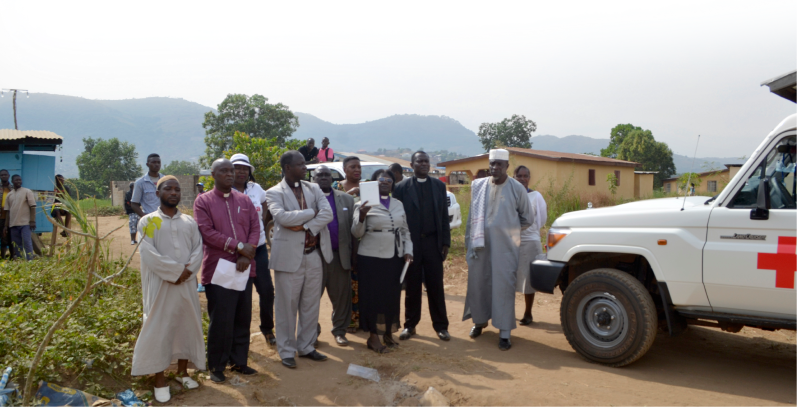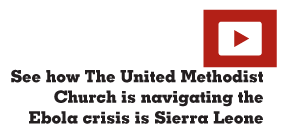



A public health worker chlorinates the shoes of Sierra Leone Bishop John K. Yambasu after he visited a woman infected with Ebola in her home.
UMNS FILE PHOTO/PHILEAS JUSU

A public health worker chlorinates the shoes of Sierra Leone Bishop John K. Yambasu after he visited a woman infected with Ebola in her home.
UMNS FILE PHOTO/PHILEAS JUSU

Last fall, members of the Religious Leaders Task Force in Sierra Leone prayed as a patient with Ebola was prepared for transport to a hospital.
UMNS FILE PHOTO/PHILEAS JUSU

Last fall, members of the Religious Leaders Task Force in Sierra Leone prayed as a patient with Ebola was prepared for transport to a hospital.
UMNS FILE PHOTO/PHILEAS JUSU
In Sierra Leone, Dr. Sahr Jimmy Rogers, a physician, was the only United Methodist in his family. His wife, Kumba Hawa Rogers, and other relatives belonged to another Christian denomination.
However, since her husband died of Ebola last year, Kumba and three of her children have attended Kercher Memorial United Methodist Church in Kenema, Sahr’s congregation. Kumba is a very active member of the congregation.
The Rev. Andrew Forbie, district superintendent and pastor in charge of Kercher Memorial, recounts how the church supported families who lost loved ones to Ebola. With assistance from United Methodist Women, the congregation supplied food and other items to quarantined homes.
“But significantly, we were a source of hope and consolation to families who lost people to Ebola,” he says.
When Rogers died of Ebola, a few members of the church held a funeral service for him at the church. Because large crowds were discouraged from gathering, the Ebola burial team processed and hurriedly buried Rogers’ remains. The church could only maintain contact with the family by cellphone. Because of a 21-day quarantine, no one could visit the family. Forbie called and prayed with the family by phone. After the quarantine period, the church’s administrative council went to the Rogers home.
“We sang; we prayed. I gave them a message of hope from John 14:1-6, asking the family not to weep like people without hope; that the God who took away Dr. Rogers, their breadwinner, will continue to provide for the family,” Forbie recalls.
The church also played a significant role in organizing a phone-in program on the community radio where United Methodists offered prayers and people called to make tributes. Many callers expressed grief over the death of Rogers, who had worked at the Kenema Government Hospital. A 40-days memorial service was also held for him at Kercher Memorial, and the family presented a gift of covers to the church bearing imprints in his memory.
“Our role was hugely appreciated by the Rogers family, and they are now part of the United Methodist family in Kenema,” Forbie explains.
From September to November 2014, the United Methodist Women provided food, spiritual and material support to families in Kenema, in eastern Sierra Leone, and to the Funkia, Goderich, Adonkia and Gbendembu communities of western Freetown, where Ebola was killing people in large numbers.
Counseling provides healing
“In one home alone, close to where I lived at the time, 21 people died of Ebola,” says Beatrice Fofanah, United Methodist Women coordinator. “It was really scary, working and living in the community. In one quarantined compound at Funkia, near Freetown, a woman with bloodshot eyes stared at me. Her husband had died of Ebola three days before. It was evident that she would become full-blown Ebola infected in a matter of days or hours.”
Fofanah’s team also provided counseling and support for women grappling with the loss of loved ones to Ebola. After a nurse and active member of Asbury United Methodist Church in eastern Freetown died in Makeni, members met and prayed with the husband.
For several months during the Ebola crisis, United Methodist Women organized group therapy sessions for women who had lost loved ones to Ebola. People who survived difficult times were encouraged to share their problems with other members of the group and tell how they coped. Participants going through similar situations learned from their coping strategies, Fofanah explains.
Because the counseling sessions proved so successful, the women had a national group therapy session in June. They invited Ebola survivors to talk to the gathering.
Mohamed Dumbuya, 40, of Makeni lost his spouse, Mariatu Kamara, 38, a class-four teacher at the United Methodist Primary School in Makeni. Life without her meant very little to him, he says, because “she was a caring wife” who meant everything to him. Until the United Methodist Ebola Response Team arrived, Dumbuya stayed in his bedroom, seldom going outside. The team prayed with Dumbuya, reassuring him that not all was lost.
Kamara left behind two children — a son, Abu G. Dumbuya, 16, and a daughter, Memuna G. Dumbuya, 7. Much as Dumbuya misses the love of his late spouse, whom he describes as “hardworking and sincere,” he also worries about the future because the family will greatly miss Kamara’s income and support for the home.
“She always spent all her income in running the home and making sure our children were comfortable,” Dumbuya remembers.
The Rev. Mariama Bockarie, United Methodist district superintendent in Makeni, prayed with and keeps in contact with the Dumbuya family, counseling the husband. She says Dumbuya has recovered significantly.
Phileas Saffa Jusu, director of communications, Sierra Leone Conference, The United Methodist Church
